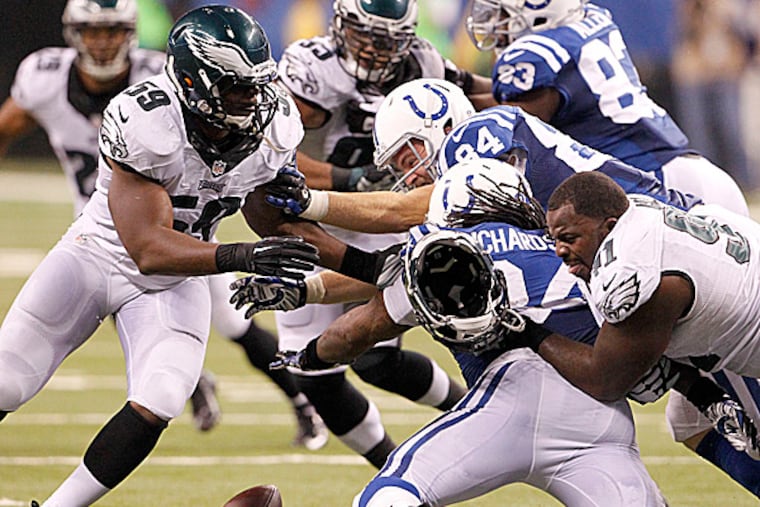Eagles' defense seems to be learning new tricks
Chip Kelly's use of scholars to help advance players' learning is paying off, especially on defense.

THE NARRATIVE from the first two come-from-behind victories of the Eagles' 2014 season goes like this: The pace of their offense wears out opposing defenses. They get tired, they get confused, they miss assignments and ultimately fail to defend plays they had no problem defending in the first half of games.
That's how the Eagles were able to cover 42 yards in four plays over the final 1 minute, 56 seconds of Monday night's 30-27 victory over the Colts, setting up Cody Parkey's game-winning field goal.
That's how Darren Sproles was able to spring loose for 51 yards with just under 4 1/2 minutes remaining, allowing for the short touchdown pass to Jeremy Maclin that tied the score at 27. It's how he got loose for a 19-yard touchdown run late in the third quarter to tie it at 20 - three plays after LeSean McCoy picked up 21 yards on a third-and-15.
"We had the right call," said Colts safety Mike Adams, whom Sproles shook before juking his way into the end zone. "I've got to make that play."
Yep. The way Fletcher Cox made the play that flipped this game upside down, popping the ball loose from Trent Richardson's grip deep in Indianapolis territory late in the third quarter. Or the way Malcolm Jenkins picked Andrew Luck as the Colts seemed poised to grab a two-possession lead with just over 5 minutes left.
Or the way the defense stiffened late, creating both of those turnovers and forcing the Colts off their own field with that final three-down stop that forced a punt and allowed for that final, frantic Eagles drive.
That's the narrative that's been obscured by the late-breaking points: The conditioning of the Eagles defense might be just as large a factor in the outcome of the first two games.
Maybe bigger.
No doubt, the halftime adjustments made by defensive coordinator Bill Davis played into it, just as the offense's adjustment did. Richardson and Ahmad Bradshaw combined for 102 yards as the Colts built their 17-6 halftime lead, but got only 47 after that.
And while Luck was not sacked for only the third time in his 34-start pro career, he passed for a modest 172 yards and averaged 5.1 yards on 20 completions. In short, he was made uncomfortable at times, most significantly in the last minutes of the game - when he has built his well-deserved reputation as a clutch performer.
"I think it's a combination of everything," Eagles head coach Chip Kelly said during his day-after news conference. "I think there is a feeling-out process how people are going to play you. They ran the ball more than we thought they were going to run the ball in the first half, so you have to make some adjustments in that standpoint. But I also think our players, during the course of the game as it went along, you can see their confidence growing and getting an understanding of what we're trying to do. So I think it's a combination of all those things."
So often we equate conditioning with physical fitness. And while Kelly's focus on nutrition and practice pace is clearly part of this narrative, they are not the only factors.
An article in the Wall Street Journal yesterday addressed Kelly's less publicized use of the academic world to improve both the quickness and scope of his players' cognitive skills. Earlier this summer, according to the story, Kelly invited K. Anders Ericsson, a leading scholar in Florida State University's cognitive psychology department, to help both his coaching staff and his players improve their understanding of increasing complex situations and their articulation of that understanding.
Oh, and to do it faster than they ever have.
To watch the Eagles defense in the second half Monday night and the previous Sunday was to watch a team of quick response. Hand signals from one side of the field to the other met most of the call changes Luck made at the line. And while the defense was victimized by Luck's hard count a little more than Davis would like, it was likely a byproduct of the learning curve, not a flaw in the process.
The bottom line is that the narrative must be expanded if the defense continues to tee it up for the offense, as it has over the first two games of the season. They might not get to the quarterback nearly enough, and their lack of linebacker depth is still unnerving. But the confusion that marred the start of last season and threatened to sabotage Kelly's first season as a pro coach has been replaced by a group that seems a step ahead of the opposing offense on more downs than not.
Especially late, with the game on the line.
On Twitter: @samdonnellon
Columns: ph.ly/Donnellon